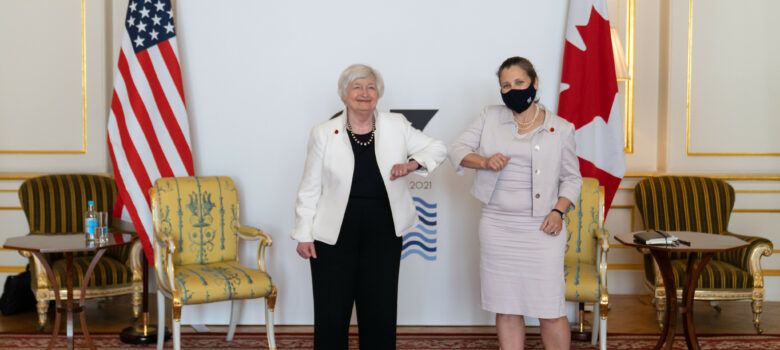The inclusion of copyright term extension in Deputy Prime Minister and Finance Minister Chrystia Freeland’s Budget 2022 may have been buried toward the very end of the last annex of the budget on page 274, but the issue has been front and centre for Freeland for many years. Indeed, Freeland has been well aware of the hidden costs arising from term extension since she was first elected in 2015. In her roles as Minister of International Trade, Minister of Foreign Affairs, and now Finance Minister, term extension has arisen repeatedly as she worked first to avoid term extension and later to maintain flexibility if forced into implementing the change.
Having fought to maintain that flexibility, it is now essential to establish a registration requirement, which would allow rights holders that want the extension to get it, while ensuring that many other works enter the public domain at the international standard of life plus 50 years. By providing for life plus 50 and the option for an additional 20 years, Canadian law would be consistent with Berne Convention formalities requirements and with its trade treaty obligations.
The copyright term extension arose within days of Freeland’s appointment as the Minister of International Trade in 2015 (with current Justice Minister David Lametti appointed as her Parliamentary Secretary). Freeland inherited the controversial Trans Pacific Partnership as the treaty negotiations concluded just weeks before the election. The new Liberal government held consultations on the TPP, including a public town hall in 2016 that I was honoured to participate in as a panelist. The government hedged on ratifying the deal, with Lametti noting there “may be ways that we can think about implementing this that would be in accordance with the treaty as negotiated but would still take some of those considerations that people have advanced, in terms of critique, into account.” The election of Donald Trump as U.S. President one year later opened the door to TPP changes as the U.S. withdrew from the agreement and Canada used the opportunity to suspend the copyright term extension requirements. The TPP became the CPTPP in 2017 and the copyright term extension requirements were no longer part of the ratification requirements.
By 2019, Freeland was the Minister of Foreign Affairs (and soon Deputy Prime Minister and Minister of Intergovernmental Affairs), leading the NAFTA renegotiation that resulted in the Canada-U.S.-Mexico Trade Agreement that once again put copyright term extension on the table, albeit with a 30 month transition period that granted Canada the ability to consider how to meet the treaty obligation. The government’s 2019 copyright review acknowledged that there were options, notably recommending a registration requirement:
The Committee believes that requiring rights-holders to register their copyright to enjoy its benefits after a period equal to the life of the author plus 50 years would mitigate some of the disadvantages of term extension, promote copyright registration, and thus increase the overall transparency of the copyright system.
The decision to include term extension was implicitly acknowledged as a U.S. demand, as this exchange with department officials in a House of Commons committee in 2020 made clear:
Liberal MP Nathaniel Erskine-Smith: I’m curious. Why are we committed to extending the copyright term for 20 years? Is this something that we put on the table, or something that we accepted because of the totality of the agreement?
Loris Mirella, Director, Intellectual Property Trade Policy, Department of Foreign Affairs, Trade and Development: That’s the outcome of the negotiations. It’s part of the negotiations of the whole agreement.
Liberal MP Nathaniel Erskine-Smith: That’s fair. I take that to mean that’s not something we put on the table, but something we accepted because broadly or overall, the agreement is in our benefit. While this provision may not well be, it’s still worth it.
After a weak (and apparently theatrical) consultation on implementing copyright term extension last year, Freeland was back on the copyright term issue several months ago, as it was used to push back against U.S. plans to create a tax credit for electronic vehicles. Freeland and International Trade Minister Mary Ng wrote to eight U.S. Senators with the following warning:
Beyond possible retaliatory actions, if the U.S. proceeds with the tax credit provisions as drafted, we would see this as a significant change in the balance of concessions agreed to in the USMCA. As such, we would consider the possible suspension of USMCA concessions of importance to the U.S. in return. Those concessions could include suspending USMCA dairy tariff-rate quotas and delaying the implementation of USMCA copyright changes.
All of which brings us to Freeland burying copyright term extension in Budget 2022. As I noted last week, this is both a terrible policy making approach (Trudeau was elected in 2015 in part on a commitment not to use the budget to sneak through legislation this way) and terrible policy that experts have termed a “tax on consumers”. Indeed, term extension was long opposed by successive Canadian governments both Liberal and Conservative for good reason: it creates significant costs with limited to no benefits. After years of grappling with the issue, it is now up to Freeland to make the best of what she surely know is a bad situation: establish a registration requirement that meets the needs of both creators and the broader Canadian public.







